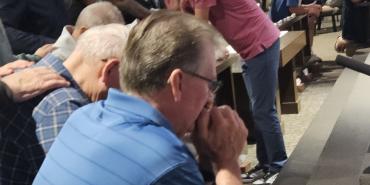Reformation Today: Moving Forward as Nazarenes

We often teach that the “Reformation period” ended in the late 1700’s, as the separation of church and state became viewed as a powerful and preferred ideal within Western political imaginations and structures. Interestingly, however, there are some who include the Reformation as merely the first half of the current “Modern period.”1
While this is certainly debatable, I think one helpful insight about this perspective is the way it reframes our role in the life of the church universal.
Ultimately, this perspective suggests that the work of reformation in the life of the church has not ended.
And this is something we can appreciate as participants in the Church of the Nazarene.
Just as Wesley and the people called Methodists in the 18th century sought to continue the work of reformation in their day, the Nazarenes in the early 20th century brought together a movement that sensed a call to “Christianize Christianity” through the pursuit of the heart-felt and socially active Christian faith promoted in Wesleyan theology.2
Over one hundred years later, we find ourselves as a denomination of many languages, cultural expressions, and life experiences seeking to be faithful and unified amidst a rapidly changing world. This is something we celebrate. It reflects aspects of the denomination’s faithfulness over our relatively short history.
However, such diversity can make decisions difficult, if we are not prepared for the coming years of discerning theology and practice. In this brief article, I offer three suggestions as we move forward in continuing the work of reformation.
Considering the “Nazarene” Identity of Jesus
The first suggestion is for us to explore how Scripture’s portrayal of Jesus’ Nazarene identity can shape our mission as Nazarenes. The origin of our denomination’s name points back to the congregation Phineas F. Bresee and others established in 1895 in Los Angeles. Bresee’s partner in ministry, J.P. Widney, explained that the name “Church of the Nazarene” would emphasize the church’s commitment to identify with the “lowly, toiling ministry of Jesus the Nazarene.”3
A primary purpose of labelling ourselves in this way was to form a group of Christians who lived in a manner that reflected the significance of Jesus being from Nazareth, a town associated with poor and marginalized communities.
In John 1:46, we find a conversation between Phillip and Nathanael, in which Nathanael is surprised to hear that the Messiah they have been waiting for is Jesus of Nazareth. His reaction was, “Nazareth! Can anything good come from there?”
What makes Nathanael’s question significant for John’s gospel narrative is that the answer is not merely that good things can come from Nazareth, but that the very definition of good is revealed to the world through a life formed in Nazareth.
God offers us “the Way, the Truth, and the Life” through Nazareth. We are the church of the Messiah from the neighborhood that most avoid, scorn, and consider the “wrong side of the tracks.”
It is not surprising that Jesus sought to help his followers understand that the Gospel is tied to the hopes, perspectives, and needs of people in forgotten, oppressed, and shamed communities.
Our denomination could have been named after an influential church leader, but the early Nazarenes chose a name that has the potential to help us remain focused on the mission of the Kingdom as we navigate new questions that are sure to emerge. As we move forward, it may serve us well to reflect on this.
Partnering with Other Groups in the Body of Christ
The second suggestion is to partner with other groups and denominations in the Body of Christ. This is simple and can happen in a variety of ways, such as shared meals, common interests, service projects, and worship gatherings. I experienced a unique ecumenical partnership during my first pastoral assignment.
A group of pastors and lay leaders from nearby congregations met monthly at a local movie theater in the middle of the week to watch and discuss a movie of their choice. Because of the day and time, the cost remained low, and the group was able to stay in the theater with the lights turned up for an hour after the credits finished rolling. The discussions were lively and interactive, and led to reflections on relationships, issues in society, and interpretations of the meaning of life.
Most of the conversations highlighted areas of mutual understanding, practice, and hope. During moments of disagreements that hinged upon theological differences, the facilitator would guide participants to appreciate the dialogue and each other’s partnership in Christian discipleship throughout the city.
Admittedly, partnering with other groups can seem like a strange way to continue the work of reformation, since reformation studies often point to divisions and departures in church history. However, dividing the church was not the reformers’ ultimate goal. Rather, they were seeking to help the church universal become more faithful. Today, we can experience reformation as reminder of the ways our denominational story is very much linked and even dependent on the stories of other denominations.
Building intentional relationships with other Christians can be a way of embracing our creedal affirmation, “I believe in the one, holy, catholic, and apostolic church” (Nicene Creed).
This also leans into what John Wesley calls a “catholic spirit,” which can be summarized as an active commitment to both understanding the doctrinal nuances of one’s own tradition, while also being in loving community with fellow Christians of differing opinions.4 This is not always easy, but it is vital in continuing the work of helping the church live more faithfully into its call.
Embracing Our Identity as a Global Church
The third suggestion is for us to grow in our identity as a global church. For the first time in the history of the Church of the Nazarene, the majority of the six General Superintendents can speak multiple languages and represent both upbringing and ministry outside of the United States. This is a unique moment. There have been many celebratory comments, shares, and “likes” expressed on social media that celebrate this historic moment, but it is important for us to consider what comes next.
Being a global church is not just about the location of our congregations, or even the background of our elected leaders, though it includes these things. Being a global church also concerns how we practice our daily Christian faith, prioritize our citizenship in the Kingdom of God, and grow in relationships with each other.
As we move forward, we must continue to develop a sense of mutuality across cultures and global contexts. This includes congregations’ building mutual partnerships of service and learning rather than one-directional mission trips. It also includes intentionally including stories and insights from diverse cultures and contexts in sermons.
This allows listeners to appreciate the unique theological and practical contributions of Nazarenes in different contexts than their own.
It means looking closely at our theology, practices, and policies to ensure that we are emphasizing a desire to grow in our relationship to each other as people equally valuable in the sight of God.
At the very least, it means taking time as a congregation to celebrate how we grown in our identity as a global church. God continues to guide us to reflect the ultimate goal of gathering people from “every nation, tribe, people, and language” (Rev 7:9).
Keeping the Focus of Reformation
Focusing on the reformation reminds us that the Holy Spirit has never stopped forming a worshipping community across cultures, places, and generations. With our commitments to holiness shaped by the Way of Jesus of Nazareth and our embrace of a global church, we bring significant contributions to broader Christian family.
As we continue the work of reforming, our goal as Nazarenes is not to compete with the rest of the Body of Christ, but to participate together in seeking to be faithful to God’s call upon the church. May we move forward as a global and partnering people who remind the church and the world that God revealed the Way, Truth, and Life through One who was shaped by identifying with the people of Nazareth.
Montague Williams is Associate Professor of Church, Culture, and Society at Point Loma Nazarene University in San Diego, California.
1. For an example, see Sally Bruyneel and Alan G. Padgett, Introducing Christianity. Maryknoll, NY: Orbis Books. 2003.
2. Stan Ingersol highlights the following themes in early Nazarene preaching as they sought a ‘religion of the warmed heart’: the justification and sanctification of sinners by grace through faith, the entire sanctification of believers, and the witness of the Holy Spirit to these works of God in human life. See page 5 of Past and Prospect.
3. https://ichurchofthenazarene.com/category/history-of-the-churchnazarene/
4. See John Wesley, “Catholic Spirit”
Holiness Today, September/October 2017
Please note: This article was originally published in 2017. All facts, figures, and titles were accurate to the best of our knowledge at that time but may have since changed.




